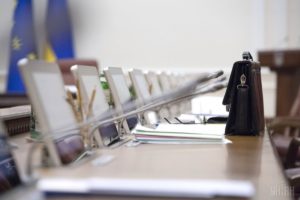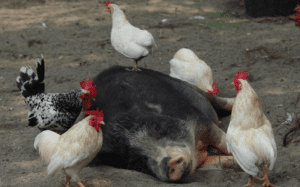
ArcelorMittal Kryvyi Rih (Dnipropetrovsk region) in 2018 invested over UAH 600 million in environment protection.
According to the company’s press release, environmental measures allow the company to comply with environmental regulations established by law.
At the same time, the press service said that the company annually allocates funds for the implementation of major investment projects, as well as for the repair of fixed assets related to environmental protection. The repairs help to maintain equipment in working condition and not to increase the burden on the environment.
Thus, in 2018, in the metallurgical production units, repairs were made to gas treatment plants of sintering machines No. 1 and No. 5, twin-steel steel-making unit No. 6, converter No. 3. Also, repair work was done on power equipment (combined heat and power plant three, cooling towers, and water lines).
In the mining department in 2018, the modernization of the crushing and ore-dressing plants was actively carried out: the gas-cleaning equipment was reconstructed, slurry pipelines were repaired and pump units were replaced in the slurry workshop. Last year, the company carried out startup works to launch new aspiration units of sections Nos. 4, 5, 6 of the ore-dressing plant No. 1.
In addition, ArcelorMittal Kryvyi Rih, when implementing large-scale investment projects, introduces the best available technologies, thanks to which it is possible to gradually reduce the burden on the environment. Major investment projects include the reconstruction of coke-oven batteries Nos. 5 and 6 using a set of environmental measures and an automated environmental monitoring system, the modernization of the sinter shop No. 2, the construction of two new machines for continuous casting of billets and new gas treatment plants and the introduction of an automated eco-monitoring system, reconstruction of ore-dressing plants of the mining department, peak boiler house, tailing dumps and other projects.
From 2006 to 2018, the enterprise invested UAH 6.2 billion in the environment, over 120 gas treatment plants were reconstructed and built, thereby achieving national standards.

The Economic Development and Trade Ministry of Ukraine continues working on the creation of a supervisory board of the Export-Credit Agency (ECA) required for the launch of the agency, First Deputy Prime Minister, Minister of Economic Development and Trade Stepan Kubiv has said.
“We have carried out some work and consultations on this issue. I think we will hold another meeting if necessary. We will resolve this issue,” he said at a government meeting in Kyiv.
Prime Minister Volodymyr Groysman reiterated the importance of launching the ECA as soon as possible. At the same time, he added that the delay was due to the fact that the government is launching such a project for the first time.
In addition, Groysman said that the agency will work not so much with its own resources as with tools for attracting resources.
“It is necessary to fill it not with a financial resource, but with tools for access to broad resources, since this is not a question of millions, it is a question of billions, perhaps dozens of billions, to support Ukrainian exports,” he said.
As reported, in February 2018, the Cabinet of Ministers approved the creation of ECA in the form of private joint-stock company and instructed the Economic Development and Trade Ministry to conduct a private placement of its shares.

The International Finance Corporation (IFC), part of the World Bank Group, has signed a loan agreement on providing financing in the amount of EUR 12.5 million to buy 64 large buses, the press service of the Finance Ministry has reported.
According to the press release, the funds are also sent to the reconstruction of the city bus depot, the renovation of repair equipment and the development of the city’s transport infrastructure management. The project will increase the capacity of public transport in the city and reduce hydrocarbon emissions into the atmosphere.
“Since 2014, decentralization is one of the key priorities of the government, and we have already transferred many financial resources to municipalities, and with them responsibility. Therefore, it is extremely important for us that international partners support this approach with financial resources. IFC investments in Mariupol infrastructure, 30 km from the front line is the best proof of our partners’ confidence in Ukraine. We hope that the financing of municipalities will become one of the important activities of the IFC in the future. We would be very grateful if IFC could become the first IFI [international financial institution] that provides such funding in hryvnia, and the Ministry of Finance is ready to support this idea,” the press service of the ministry reported, citing Deputy Minister for European Integration Yuriy Heletei.
As reported, referring to IFC, the loan will amount to 14% of the city’s projected multi-sectoral capital investment program of $90 million in 2019-2010.
IFC, a member of the World Bank Group, is a large international investor focused on the private sector in Ukraine. The total amount of its investment in long-term projects in various economic sectors of Ukraine has reached over $3.2 billion.

Cattle numbers in Ukraine (excluding the temporarily occupied territory of Crimea and part of Donbas) as of February 1, 2019 amounted to 3.392 million animals, which is 3.4% less than on the same date of 2018.
According to the State Statistics Service, the number of cows during this period decreased by 3.6% and amounted to 1.928 million.
The number of pigs fell by 1%, to 5.912 million, sheep and goats by 3%, to 1.265 million.
Poultry numbers in the country compared with February 1, 2018 increased by 3.8%, amounting to 207.614 million birds.

The volume of sales of services by telecommunications and postal communications enterprises in Ukraine in 2018 amounted to UAH 72.565 billion, which in absolute prices is higher than the level of 2017 by 10%, according to the State Statistics Service of Ukraine.
According to its data, the volume of services provided to the population amounted to UAH 42.9 billion, or 59.1% of the total volume of services sold, which is 12.9% up from last year.
At the same time, in comparable prices compared to 2017 the volume of services sold as a whole decreased by 0.4% and in terms of providing services to the population grew by 0.6%.
In particular, in absolute prices in 2018 the volume of sales of postal and courier services grew by 9.75%, to UAH 6.1 billion, of which services rendered to the population amounted to UAH 1.7 million, which is 27.5% up from last year.
The volume of sales of mobile communications services in 2018 grew by 9.4%, to UAH 38.5 billion, of which services provided to the public amounted to UAH 26.6 billion (13.49% up from 2017).
The volume of sales of Internet services in 2018 also rose by 13.5% and amounted to UAH 12.3 billion, of which the population was provided with services worth UAH 8.8 billion (18.9% up from 2017).

Zaporizhia Automobile Plant (ZAZ), part of the UkrAVTO Corporation, has started producing a pilot batch of LS Mtron tractors to study the process of production and demand, Spokesman of the Corporation Dmytro Skliarenko has said. “The creation of a joint venture with the manufacturer is not being discussed yet,” he told Interfax-Ukraine.
The corporation does not disclose other details of the project. As reported, in autumn 2017, the UkrAVTO Corporation, the leading player on the Ukrainian automobile market, was studying consumer demand on tractors of South Korea’s LS, which has not yet been presented in Ukraine. UkrAVTO presented these tractors at the AGROEXPO 2017 exhibition held in Kropyvnytsky.
The company said that this step looks completely logical and justified, since the agricultural sector begins to show upward pace and has a great potential and prospects for larger development.
Later the distribution agreement with LS company was signed. LS is the exclusive supplier of tractors under the governmental agriculture development program in South Korea.
According to experts, according to their characteristics, LS are direct competitors of the most popular MTZ Belarus tractors in Ukraine.
UkrAVTO intends to stake in Ukraine on two models of LS tractors: V-series with a capacity of 70-80 hp and H-series with a capacity of 110-140 hp. The LS tractors’ price starts from $38,000, and the price of the most powerful is $70,000.
At the same time, ZAZ, at present, amid the crisis in the automotive industry in Ukraine, has stopped the production of passenger cars.
UkrAVTO was registered in 1992. It holds a controlling stake in CJSC ZAZ and Poland’s FSO. The corporation includes over 400 car servicing enterprises in all Ukrainian cities, distribution and dealer companies of the leading car brands and the filling station network.